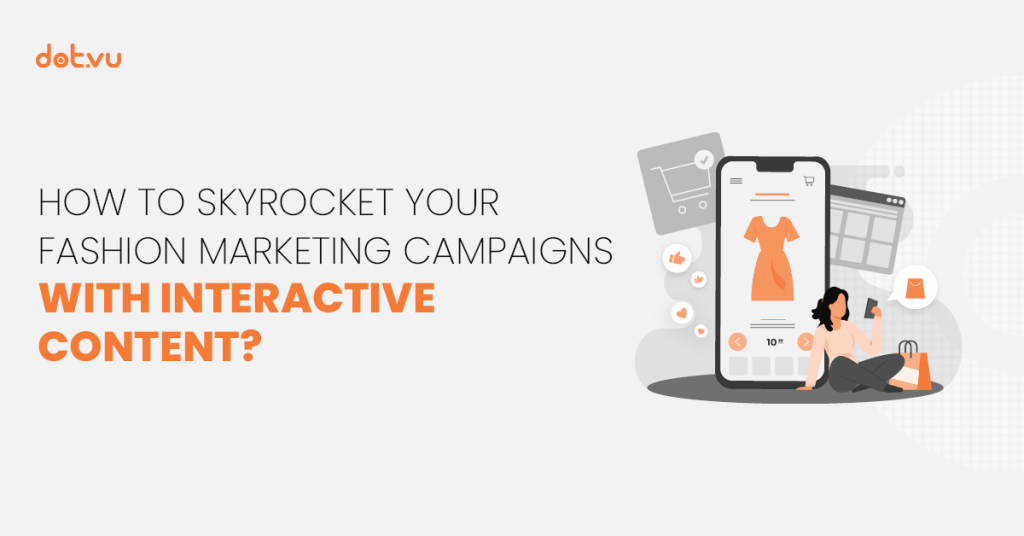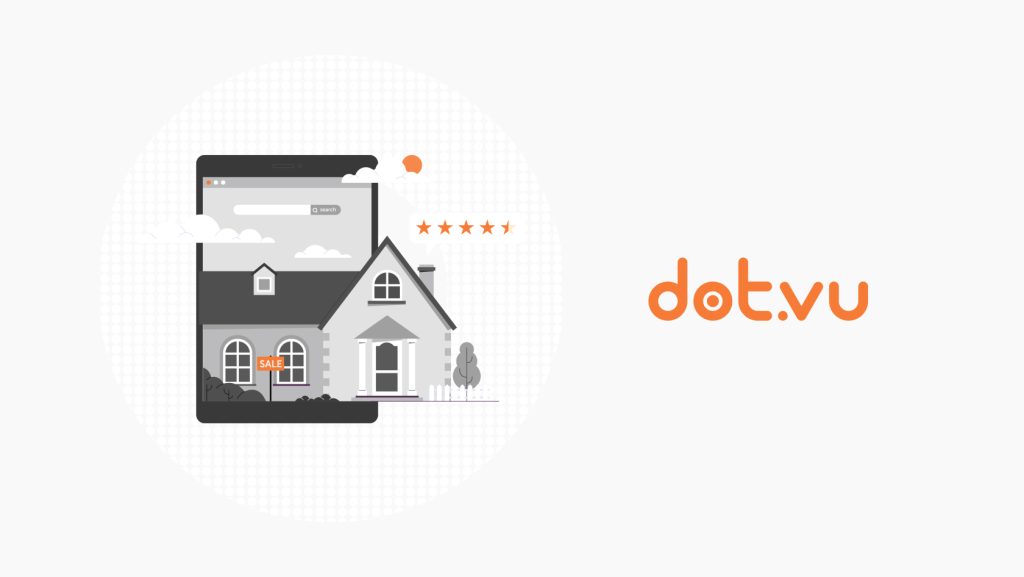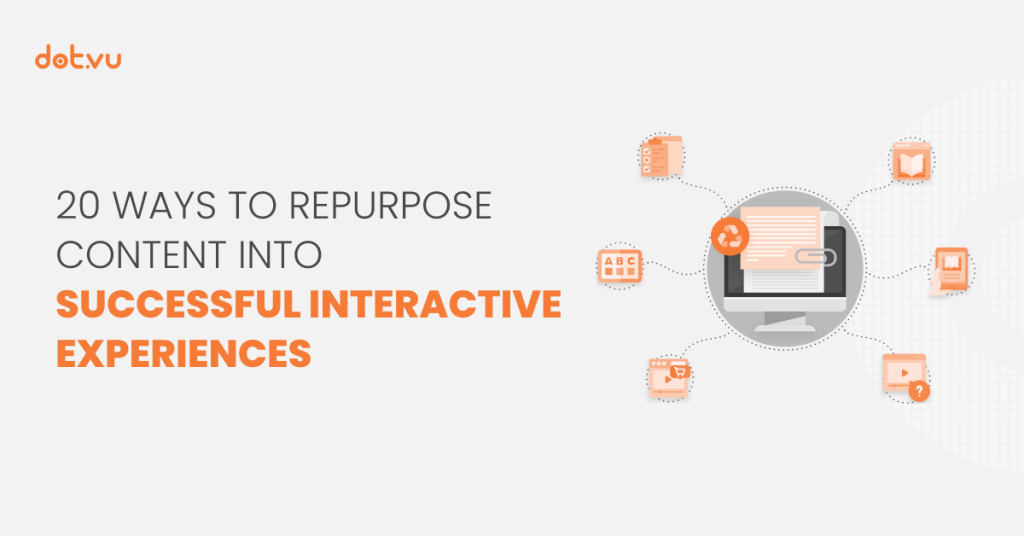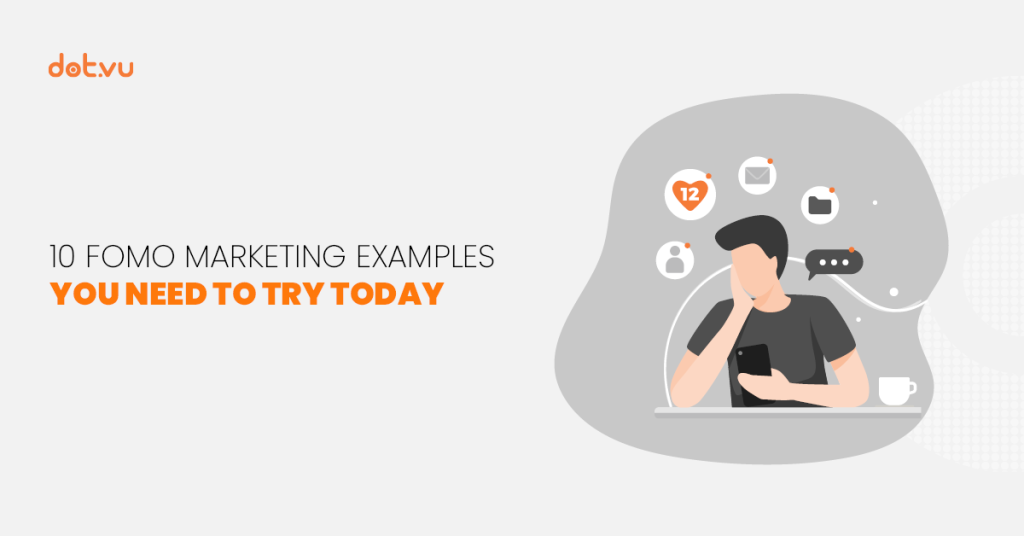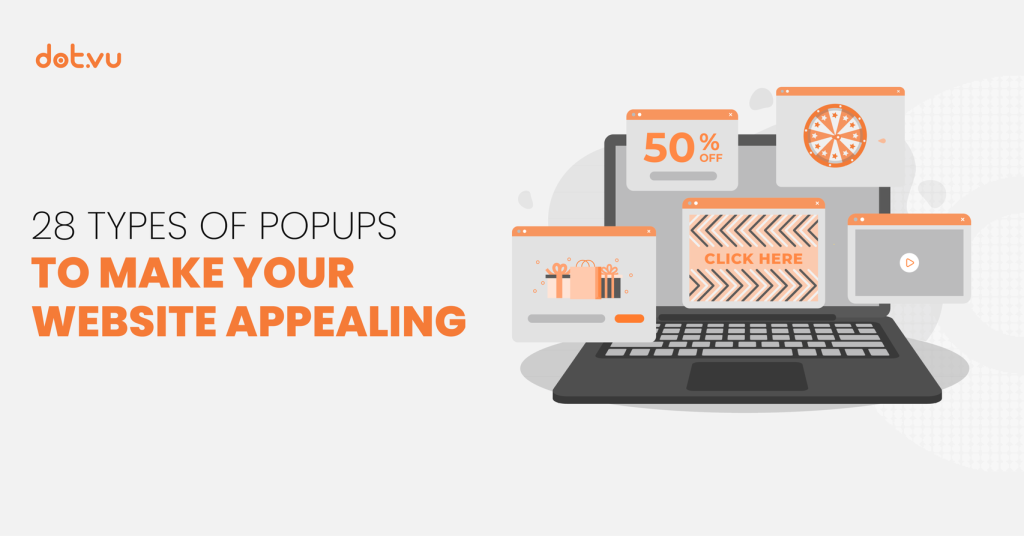
There are many different types of popups, each one of them with its own advantages and disadvantages. Although popups are often perceived as annoying and distracting, companies still use them to grab attention. And there is a great reason for that! When offering value to the right person at the right time, popups are a super powerful marketing tool for boosting conversion.
In this blog post, we will guide you through the most popular types of popups. However, we will also introduce you to the concept of Interactive Popups. You might have seen small windows appearing on a page inviting you to spin a wheel. These are gamified experiences. Now imagine the possibility of incorporating ANY type of Interactive Content in your popups, taking engagement to the next level. Think of it as “Popups 2.0”!
Table of contents:
- How do popups work?
- How to create effective popups?
- Benefits of using website popups.
- 28 Types of popups
How do popups work?
Popups load when a visitor has spent a certain amount of time on a page. They could also appear as a result of actions like clicking, hovering, or trying to exit the page.
You can define and set any trigger. For example, you can choose “2 minutes time on page”. So, when users browse a certain page for two minutes, a message will load. Selecting your triggers is a crucial element of your popup strategy success.
Finally, when you combine popups with Interactive Content, the messages load based on custom conditions. When visitors engage with Interactive Experiences on your website, you can collect information on their preferences. For instance, a Guided Selling experience will tell you more about the products every user prefers. Therefore, you can display personalized popups with discount codes on your audiences favorite items.
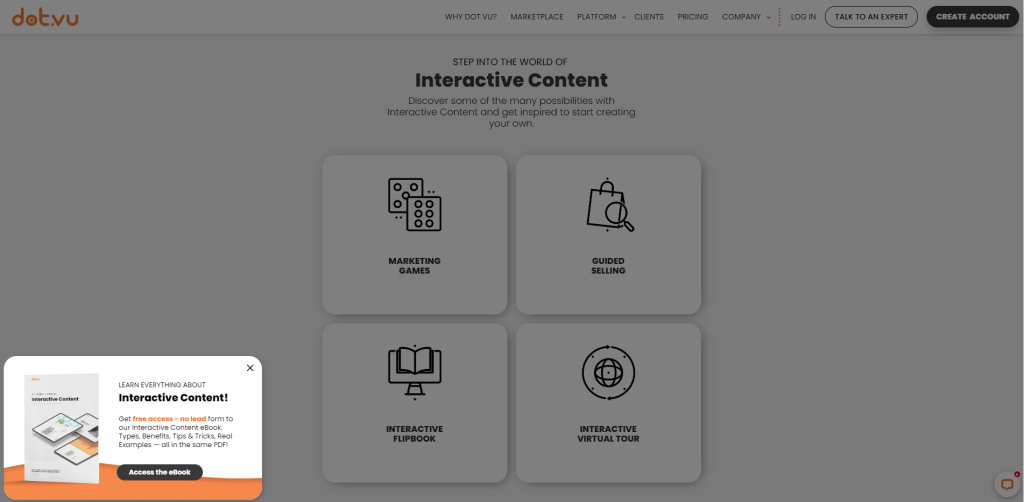
How to create effective popups?
These are the factors that set bad popups apart from excellent, effective popups:
- Irresistible offer and value. Time is precious. When you interrupt your visitors, you must bring value. Otherwise, you are running the risk of pushing users away.
- Context. Your popups need to appear ONLY when it makes sense. For instance, when a user is browsing a wine product page, showing a popup with discount codes for whiskey is out of context.
- Respecting the user. If a user closes the popups, he or she is not interested. Programming your message to appear over and over again will annoy your website visitors. So, remember to respect people’s choices.
- Right timing. Stumbling upon an intrusive window right after opening a page is annoying. Give your visitors some time to explore your website first.
- Personalization. Generic popup messages tend to have lower conversion rates. The more personalized the offer, the higher the chances of grabbing the user’s attention.
- Interactivity. Popups have been there for years. Even if you use all the best practices we mentioned, you will not differentiate your messages. Encouraging your audience to interact with the popups will spark interest. There is another factor that plays a significant role here – the Zeigarnik effect. People are more likely to recall unfinished tasks better than completed ones. They are also more likely to finish the process once they’ve started. Therefore, placing an Interactive Experience in your popup will increase your completion rates. Why? Because if visitors play a game, engage with a video, or answer a quiz, they are prone to continue their interactions with the popup.
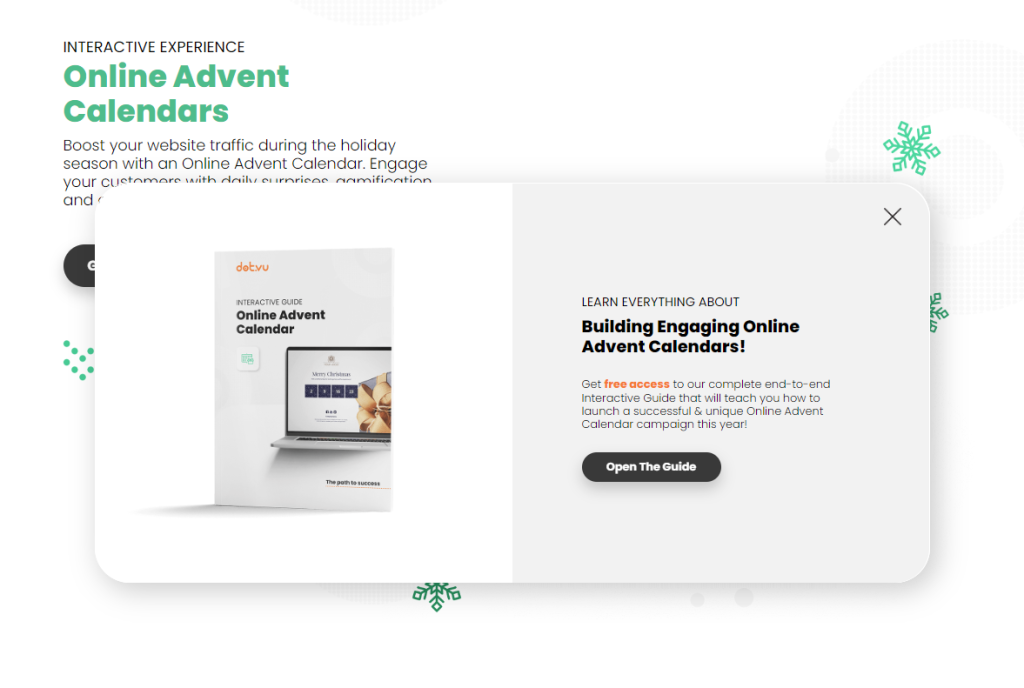
Benefits of using website popups
When used correctly, popups have a plethora of benefits for your business. Let’s explore them detail:
- Capturing people’s attention. As a popup window interrupts your visitors, the message captures attention immediately. Therefore, you have the perfect opportunity to communicate with your audience.
- Customizable. You have complete freedom in terms of the design. You can customize your popup in any way that makes sense for your brand identity and business goals.
- Increasing sales. Some popup messages tend to have a reasonable conversion rate. However, it all depends on the offer you display – so make sure make it irresistible.
Nonetheless, you should consider the disadvantages, too:
- Bad reputation. As previously mentioned, people perceive popup messages as annoying. As a result, many of them rush to close the windows and continue browsing. In the worst-case scenario,
- Ad blockers. The increasing usage of ad blockers might ruin your efforts. Although they don’t remove all popups, chances are not all visitors will see your offers.
- Bad user experience. Overusing popups might cause a bad user experience.
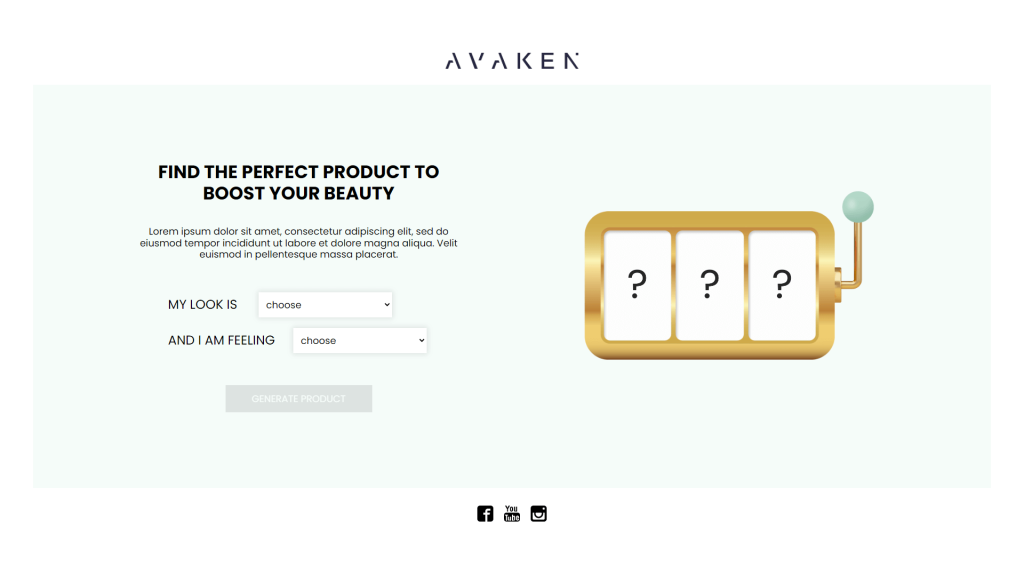
28 Types of popups to make your website appealing
Types of popups based on actions
1. On-landing
As soon as the visitor opens a specific page, a pop up loads. In some cases, showing a new message to your audience before they even got a chance to know you could be a bit “aggressive.”
2. On-exit
Also called exit-intent, these popups appear when a user tries to exit the page. Using mouse tracking, this type of popup has the purpose of encouraging your visitors to stay a bit longer on your website.
3. On scroll
Companies also set their popups to appear based on the user scrolling to a particular part of the page.
4. On click
The on-click popups allow businesses to make relevant offers. After all, when users click on an element, they show interest.
5. On hover
Similar to the popup triggered by clicks, an on-hover popup loads when a user hovers over a specific element.
6. Time on page
These popups reveal after the user has spent a certain amount of time on your website.
7. Custom actions
You can also program popups to show to users based on the person’s previous actions on your website.
8. Multiple conditions
This is a more advanced trigger, requiring the user to complete a combination of actions. For example, it can be a mix of pages and time.
9. Page level targeting
These popup types show after a user scrolls a certain % of the page.
10. Inactivity popup
This popup appears if a visitor remains inactive for some time. The purpose is to reactivate the user.
Types of popups based on interactivity
Adding interactive touchpoints will make your popups better than ever. Why would you display a generic 10% discount code to all your visitors, when you can give personalized offers to the users depending on their actions? Here are some of the best types of popups with interactive elements:
11. Gamified popups
Many businesses use gamified popups to incentivize purchases via rewards. For example, we have seen many popups containing a wheel with discount codes for prizes. However, you don’t have to limit yourself to spin the wheel or slot machines. You can place any type of Marketing Game in your popup to boost engagement and give instant gratification.
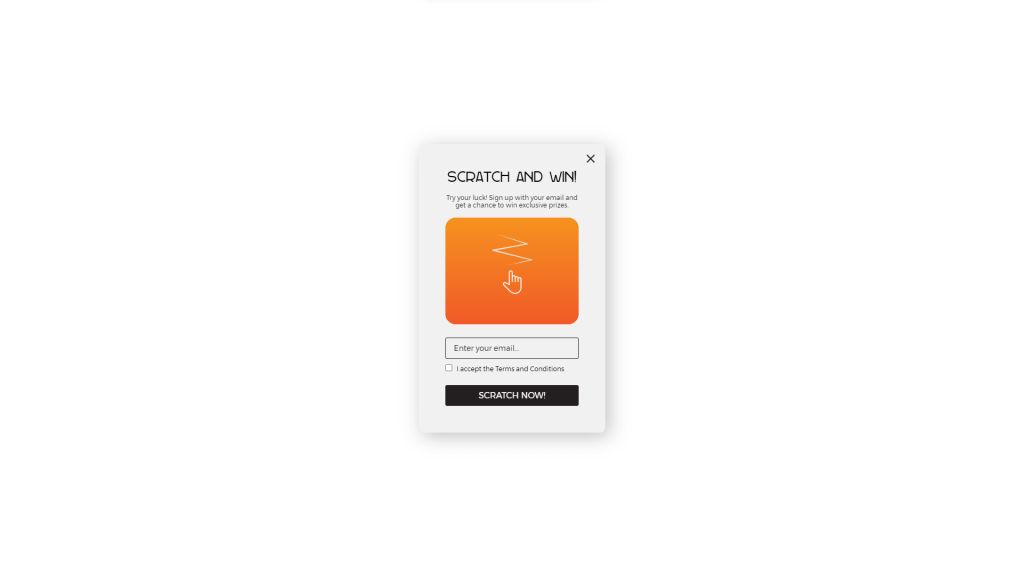
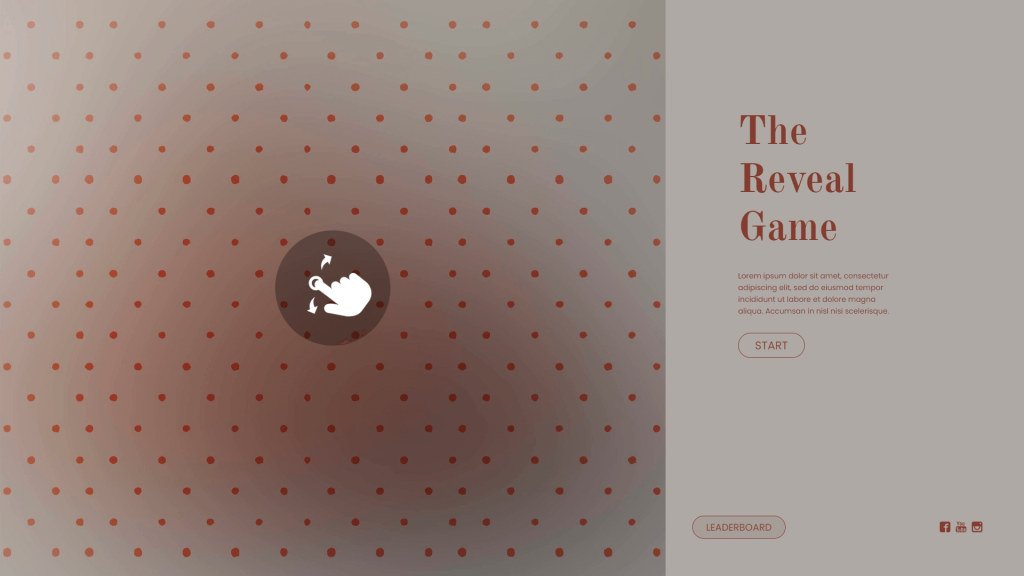
12. Popups with Interactive Videos
Interactive Videos take linear videos to the next level by encouraging the audience to become active participants in the journey. Now, imagine the possibilities you have with combining popups and Interactive Videos, giving your visitors an unforgettable experience with your brand.
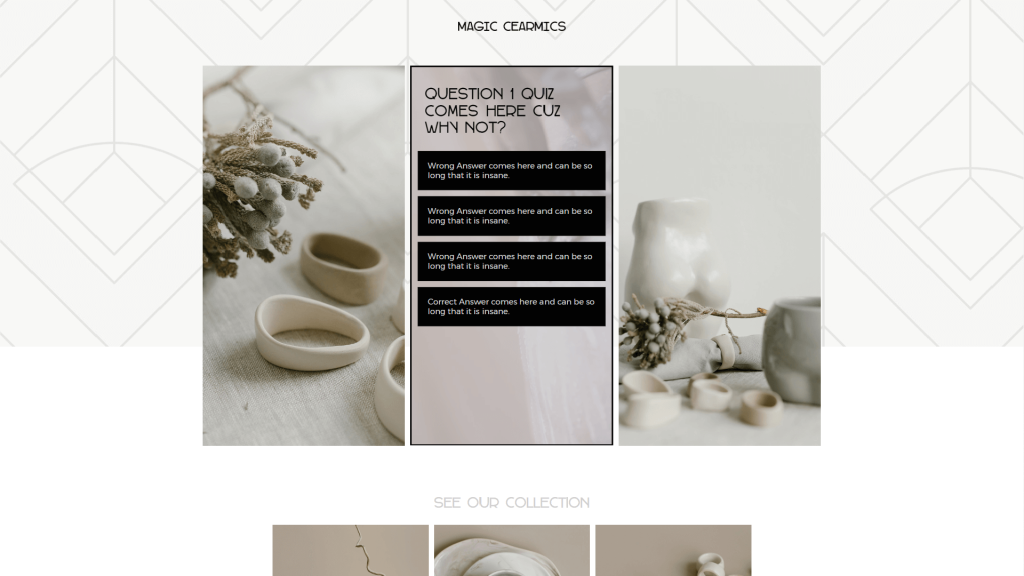
Related: What is an Interactive Video
13. Popups with Interactive Flipbooks
Companies use Interactive Flipbooks, catalogs, and eBooks more often than ever before. Now, you can also place your flipbook in a popup to target specific visitors who show interest in your brand by clicking or hovering on your content.
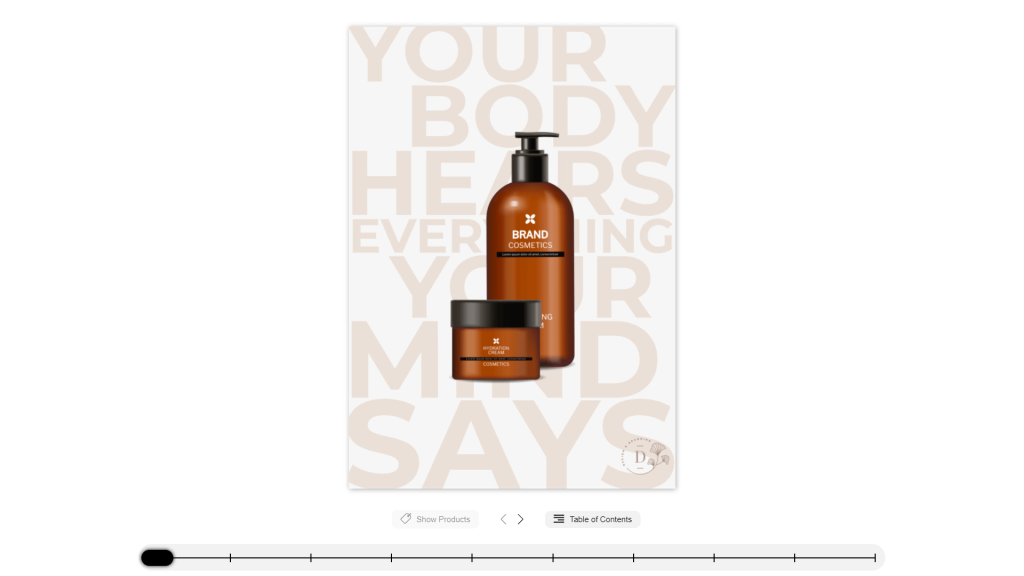
Related: What is an Interactive Flipbook?
14. Popups with Guided Selling
Imagine a user browsing, for instance, your houseplant product landing page. He or she has spent some time with your brand and probably considers buying a product. Of course, you can have a written guide for choosing a houseplant. OR you can provide them with an Interactive Guided Selling Experience appearing on the page. By doing that, you give real value, helping your potential customers save time and pick the best houseplant for their preferences.
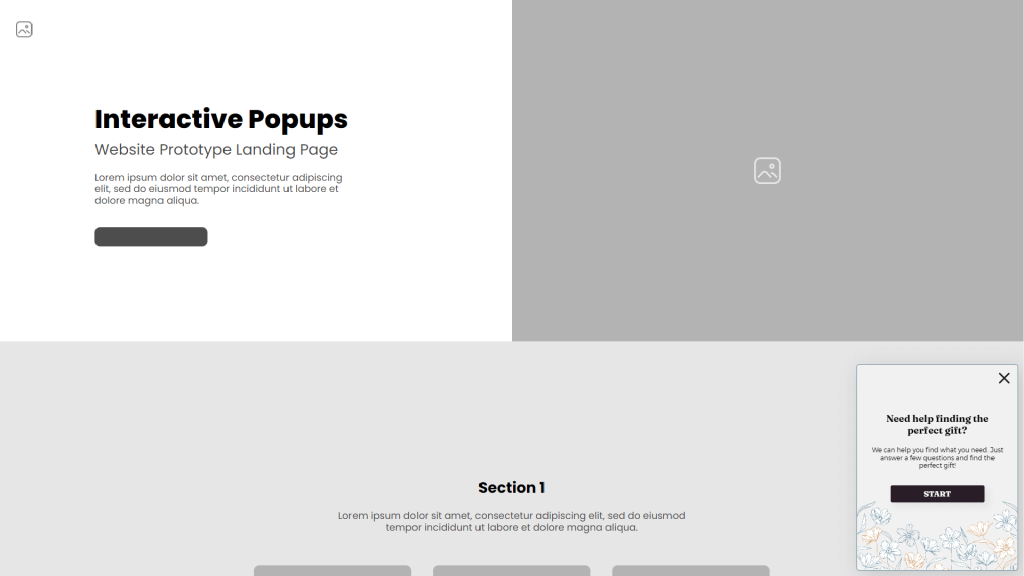
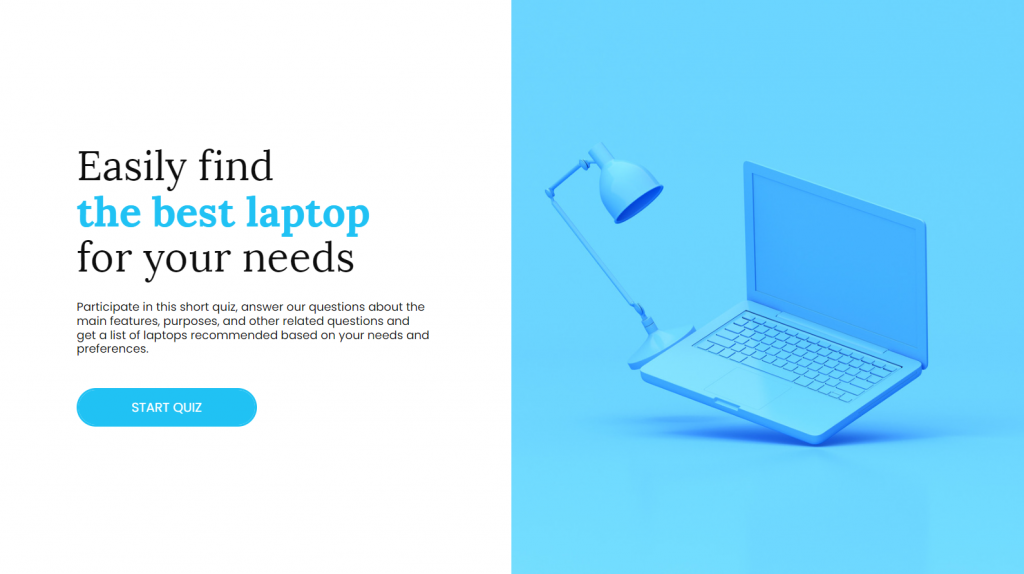
Related: What is Guided Selling?
Pro tip: Remember to stock up on the items you suggest in your popup Guided Selling!
15. Popups with Interactive Conversation
Interactive Conversations are excellent tools for communication with your customers. The good news is, now you can insert an Interactive Conversation in a popup to assist your visitors in their journeys.
16. Popups with Quizzes or Surveys
Asking customers about their opinion is a fantastic way to show appreciation. Placing your survey in a subtle scroll or slide-in will not annoy your visitors. On the contrary, the ones who are emotionally attached to your brand will be glad to complete a short questionnaire and share their thoughts.
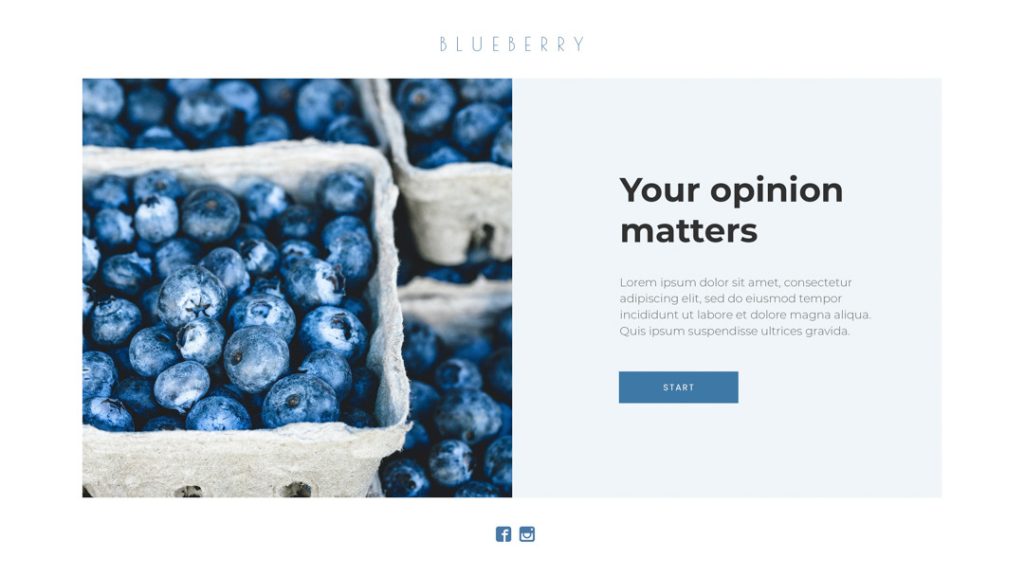
Pro tip: When using Interactive Content, you can track every interaction. For instance, you can collect answers, clicks, and time spent on every experience. Therefore, you will get to know your audience better. So, you can use this data to create personalized offers for your customers.
Types of popups based on position
You can place your popups anywhere on the page. Here are the most common types of popups based on their position:
17. Website bar
These popup types appear at the top or bottom of the screen.
18. Full screen
This type of popups covers the entire screen. So, it is not a subtle way to grab attention.
19. Lightbox popups
You can align your popup vertically and horizontally in the centre of the screen.
20. Sidebar
These popup types appear on the left or right side of the screen. They tend to be less intrusive than other windows.
21. Slide-in popups
Popups can slide in from the side, top, or bottom of the page for a better effect.
22. Floating messages
Popups can load and stay in one place, but they can also float, capturing your audience’s attention to a higher extent.
Types of popups based on purpose
23. Promotional purposes
Promotional popups are extremely popular. In fact, most of the popups messages will have a promotional purpose.
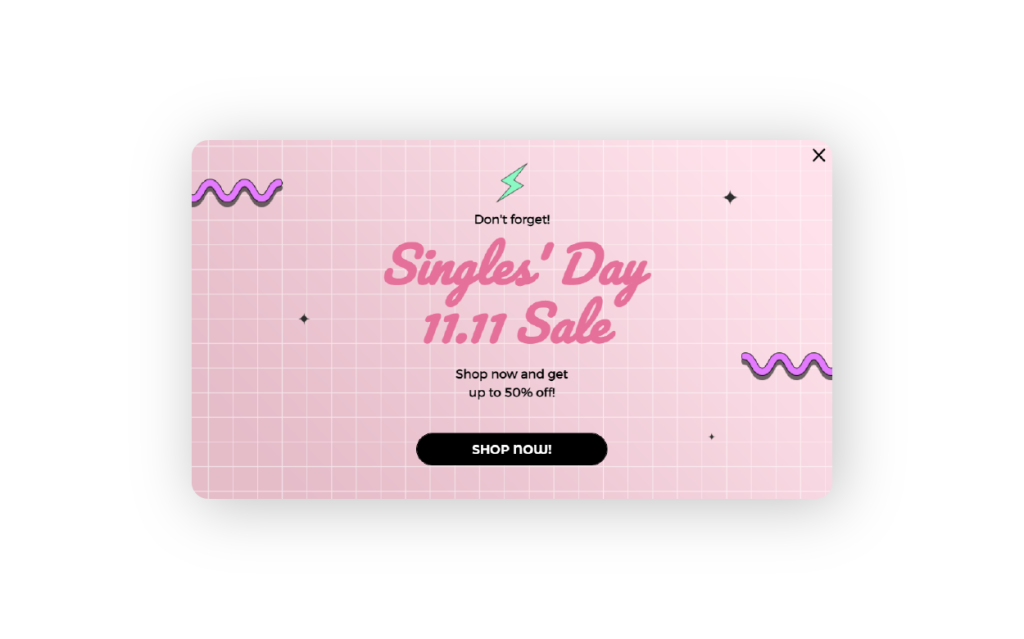
24. Seasonal promotions
As the name suggests, these popups are used during seasonal marketing campaigns. The content can be anything from announcements to giveaways. You can use Hourly Surprises in your seasonal popups to generate a sense of urgency and incentivize purchases.
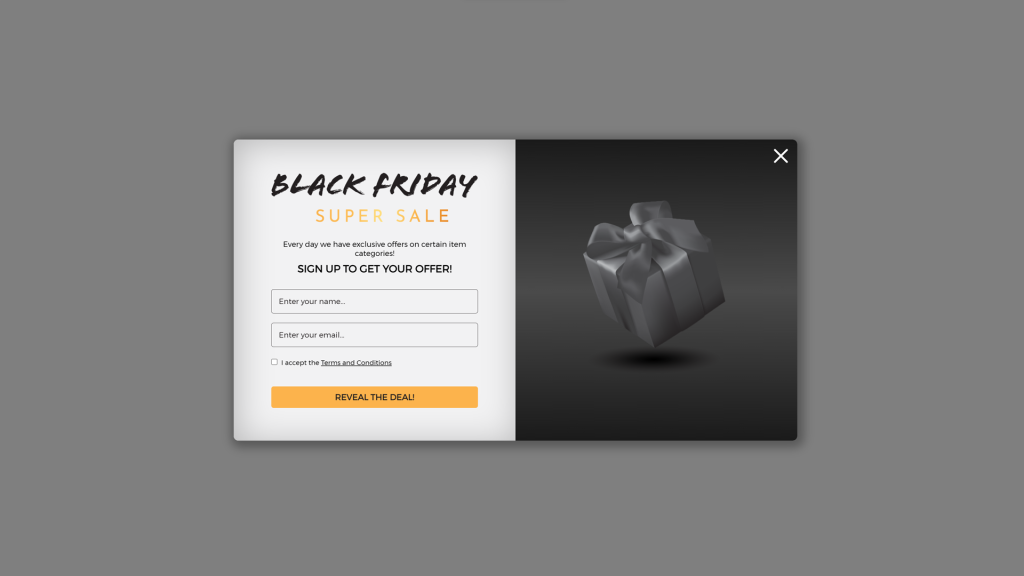
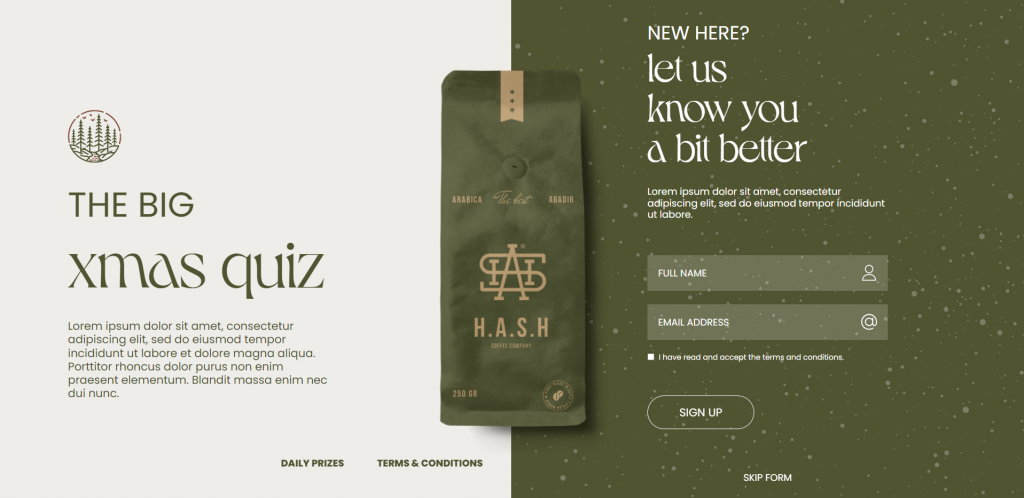
25. Informational
Organizations also leverage the power of popups for information purposes. Announcing news or changes via a small window informs the users who already demonstrate an interest in your brand.
26. Educational
Promoting your eBooks or educational materials through popups is an effective way to position your brand as a thought leader and generate leads.
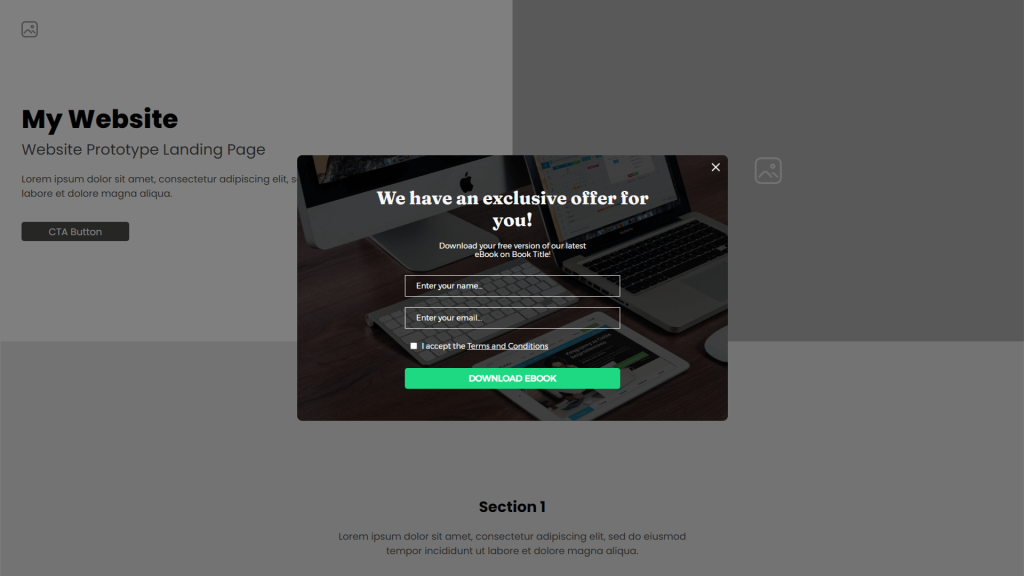
Pro tip: Create sense of urgency with limited offers. For instance, you can provide free access to your exclusive eBook for two days only.
27. Registration forms
Registration form popups appear on event landing pages. They are not so annoying as they are relevant to the user.
28. Giveaways
Some companies give their giveaways more visibility with well-designed popups.
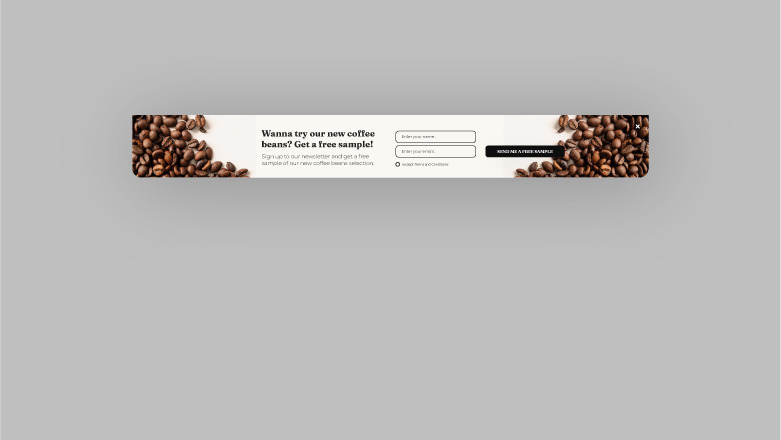
Take your popups to the next level with Interactive Content!
Popups are great marketing tools for any business. But why not replace them with a far more exciting experience – Interactive Popups?! Not only will you justify interrupting your visitors, but you will also provide them with 100% personalized offers they can’t refuse.
Dot.vu is an Interactive Content platform with a large variety of Interactive Experiences. Explore our marketplace to find the type that suits you. You can have any experience placed on a popup, setting a trigger that will load the message on your website.
Create a free account to try any of the Interactive Popup templates in no time!
